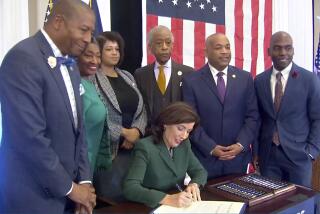S. Africa Hearings to Focus on Rights Violations
- Share via
JOHANNESBURG, South Africa — Wellington Moluli wore sunglasses in the dark sanctuary of the Central Methodist Church in downtown Johannesburg. Twig-thin with a slight tremor, Moluli spoke haltingly as he described his time in solitary confinement as a political prisoner.
“I was a youth organizer for the ANC (African National Congress) in Soweto,” said the 26-year-old Moluli. “I was arrested in 1986, taken straight to solitary confinement and later tortured. They shocked me and tore my teeth out,” he said, opening his mouth to reveal missing molars.
“I would like the people who did this to me to be punished, but really I don’t expect that to happen. But I want to tell my story, I want people to know what happened to me.”
Moluli had just come from a meeting of the Khulumani Support Group, a program organized by churches and nongovernmental organizations in an attempt to bring what is called the truth and reconciliation process--South Africa’s effort to learn as much as possible about human rights violations during the apartheid era--to all South Africans.
A more formal procedure, run by a committee known as the Truth and Reconciliation Commission, is set to begin hearings Monday. The commission will hear both from perpetrators--to whom amnesty will be granted under certain criteria--and from victims of human rights abuses.
Although most victims have the right to apply to the commission to testify, the sheer number of cases will restrict the committee to hearing higher-profile instances of abuse and prevent it from hearing the countless ones that did not make headlines.
“The formal commission has major limitations,” said the Rev. Demetris Palos, a Methodist minister who helps run Khulumani training sessions in Johannesburg. “Although the commission will hear a lot of cases, there are many victims who will never get the chance to tell them their stories. That’s where we come in.”
*
As part of the negotiations between the all-white National Party and the African National Congress that led to South Africa’s first multiracial elections in April 1994, an agreement was made to grant amnesty to people who committed political crimes in the past. But instead of granting a blanket amnesty to perpetrators, it was agreed to establish a body to hear evidence in exchange for amnesty, getting testimony from victims as well as perpetrators.
The Truth and Reconciliation Commission grew out of this agreement. The commission will run for about two years and hear cases that occurred between March 1, 1960, and December 5, 1993.
“For us at the Truth and Reconciliation Commission, programs like Khulumani are extremely important,” said Fazel Randera, one of the 17 members of the commission. “They are convincing people to come forward to tell their stories, showing them how the process works, and giving them support as well. There is no way we could have gathered the amount of information they have been able to compile.”
The South African Council of Churches, to which most South African churches belong, is working on a variety of fronts, from gathering testimony to working with victims still suffering from trauma from the apartheid era, according to the Rev. Gary Thompson, an Anglican minister with the council.
So far, the Anglican, Catholic and Methodist churches have been most active in running Khulumani and other programs.
But the South African Council of Churches is emphasizing working with trainers from the almost exclusively black African Independent Churches. Through the Commission of African Independent Churches, the council hopes to spread the word about the Truth and Reconciliation Commission to the people in the townships and in rural areas where the mainline churches are not so prevalent, said Thompson.
“We provide people an opportunity to talk,” says Maggie Friedman, a founder of Khulumani. “Talking doesn’t oblige them to do anything, but if they are interested in getting their story known, we’ll help them. We just want the lesser known victims to get a fair deal,” she said.
Although at the moment Khulumani and other programs are being visited entirely by victims, they could reach perpetrators as well, according to Mdu Lembede, a spokesman for the commission in KwaZulu-Natal, an area swamped with applications for amnesty.
“Perpetrators are also victims in a way,” said Lembede. “There are policemen and security-force people out there who were made to do these things, and they have had to live with it inside themselves. All they need is a chance to get it off their chest.
“The Khulumani groups can bring those people to us, too. It is all part of the healing process, and the more people we hear from, the better off we’ll be.”
More to Read
Sign up for Essential California
The most important California stories and recommendations in your inbox every morning.
You may occasionally receive promotional content from the Los Angeles Times.













